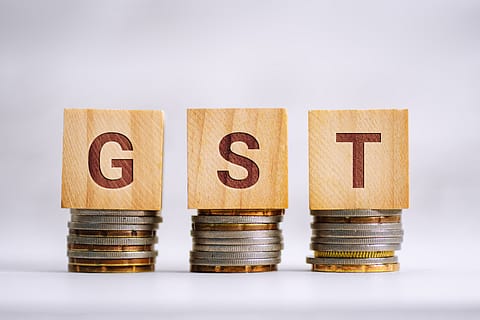GST collection rises 6.5% to ₹1.73 lakh cr in Sep
Of the total gross revenue, the integrated GST (IGST) accounted for the largest share at 52%, amounting to ₹90,594 crore.

The country's gross GST revenue collection for September reached ₹1.73 lakh crore, reflecting a 6.5% increase compared to the collection of ₹1.62 lakh crore during the same month last year. However, the September collection is nearly 1% lower than the August figure of ₹1.74 lakh crore.
Of the total gross revenue, the integrated GST (IGST) accounted for the largest share at 52%, amounting to ₹90,594 crore. The state GST (SGST) stood at ₹39,283 crore, representing 23%, and the central GST (CGST) at ₹31,422 crore, accounting for 18% of the total revenue.
Net GST revenues rose to ₹1.52 lakh crore, marking a 3.9% increase from ₹1.47 lakh crore in September 2023. This net revenue collection also surpassed last month's figure by 2%, which stood at ₹1.50 lakh crore.
Domestic refunds amounted to ₹10,685 crore in September, reflecting a 25% decline from the previous month’s refunds of ₹14,298 crore. The refunds however were 24.3% higher compared to the same month last year.
The central jurisdiction recorded the highest year-on-year growth in GST domestic revenues, with a 33% increase from ₹196 crore to ₹261 crore, surpassing all other states. Ladakh and Haryana followed with a 24% rise in revenues. Maharashtra collected the highest revenue, amounting to ₹26,369 crore.
Revenue from the import of goods also grew by 8%, reaching ₹45,390 crore. During the same period, refunds totalling ₹20,458 crore were issued, representing a 31% increase compared to the same month last year.
The GST Council meeting held in early September, chaired by Finance Minister Nirmala Sitharaman, had decided to establish a Group of Ministers (GoM) to explore reducing GST rates on life and health insurance. Headed by Bihar Deputy Chief Minister Samrat Choudhary, the GoM is expected to submit its report by the end of October. The findings are to be reviewed by the GST Council in its November meeting, where the final decision will be taken.
Recommended Stories
The Council also announced a reduction in GST on cancer drugs from 12% to 5% and on namkeens from 18% to 12%. Additionally, a separate GoM has been formed to address the compensation cess issue beyond March 2026. A secretaries’ committee will also be established to resolve the negative balance in the integrated GST (IGST) by focusing on fund retrieval from states.
Notable decisions taken during the 54th GST council September meeting included exempting foreign airline companies from GST on the import of services and exempting universities and research centres, either established by central or state laws or those with income tax exemptions, from paying GST on research funding.
During the post-meeting press conference, Sitharaman revealed that the projected cess collection until March 2026 is ₹8.66 lakh crore. Other decisions included the introduction of a Business-to-Customer (B2C) GST invoicing system effective October 1, and an increase in GST on car seats from 18% to 28%.